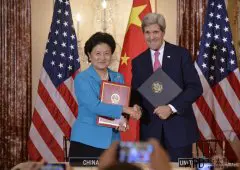Leaving the European Union without a deal in place would not spell disaster for the UK economy, according to a free market thinktank advocating trade with the rest of the world over a “hamstrung” deal with Brussels.
Despite repeated warnings that leaving without an agreement would hurt British companies and consumers, the report from the Institute of Economic Affairs, published on Friday, says the UK could remove all import barriers to achieve lower prices for consumers, increased productivity and higher wages.
However, a separate report from the Institute for Government, which seeks to promote more effective government, said failure to strike a deal would put the UK in a worse place than any other major trading partner and maximise disruption.
Britain should resort to World Trade Organisation rules for its relationship with Europe if a bad deal is offered, while striking free trade agreements with major trading partners such as the US, Canada and Australia, according to the IEA report. It would then be up to Brussels if it wanted to impose tariffs on British imports, which the thinktank said would hurt EU consumers.
The position echoes that of the international trade secretary, Liam Fox, who has advocated deals with the US and other countries and argued that the UK is in a position to walk away from the negotiating table if no deal can be reached with Brussels. EU leaders have poured cold water on Britain’s hopes of such arrangements in recent days.
British consumers could benefit from the removal of all tariffs because the UK would be able to import goods at lower prices from countries on which the EU imposes high tariffs, such as oranges from South Africa, according to the IEA. Such tariffs protect the livelihoods of domestic producers, although 92% of UK workers are employed in sectors that do not benefit from such measures, according to the report.
Although removing tariffs could result in job losses for the 8% of British workers in protected sectors, such as farming, the IEA said new roles could be created to offset the losses.
Jamie Whyte, research director at the IEA, said: “There are many myths being perpetuated about trade policy – and more specifically about the UK’s relationship with the EU – that must be debunked. We could unilaterally eliminate all import tariffs, which would give us most of the benefits of trade, and export to the EU under the umbrella of the WTO rules.”
Ministers have begun privately admitting that negotiations over the future trade relationship with the EU may not begin until the end of the year, cutting the time for talks to as little as 10 months. Britain agreed in June to discuss the withdrawal agreement first, with talks moving on to trade only once sufficient progress had been made on settling the rights of EU nationals in the UK, the Brexit divorce bill and the border with Ireland.
The Institute for Government said leaving with no deal was a “recipe for maximum disruption” should the UK have to trade with the EU under WTO rules, because it would include higher tariffs and more document checks and inspections at borders.
Leaving the EU would disrupt the flow of goods required by manufacturers in the UK, harming sectors such as car production, and create friction in trade across borders, its report, published on Thursday, concluded.
(THE GUARDIAN)
 简体中文
简体中文

